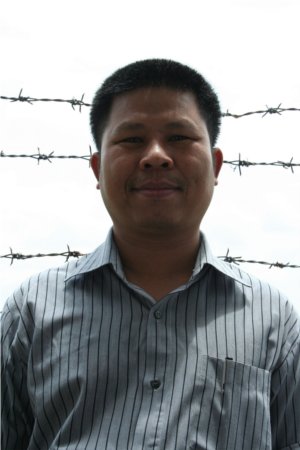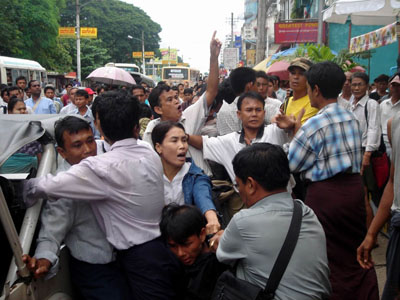The final piece in the Burmese military regimes, 'Road Map to Democracy', is the national elections planned for 2010. As part of their 'Road Map', in May 2008, the regime held a national referendum to vote on a draft constitution.
 Many international observers, including the New York based Human Rights Watch, said the process was a sham. Human Rights Watch said the referendum "…lack freedom of access to information, freedom of speech and expression, a free media, and freedom of association and assembly."
Many international observers, including the New York based Human Rights Watch, said the process was a sham. Human Rights Watch said the referendum "…lack freedom of access to information, freedom of speech and expression, a free media, and freedom of association and assembly."
As the 2010 election fast approaches it seems nothing has changed for the Burmese people.
According to the Assistance Association for Political Prisoners, the regime is still jailing people for their political activities. AAPP's website says there are a total of 2,168 political prisoners in Burma.
"This is an overall increase of 49 in comparison to last month's figure of 2,119. In October, 41 political prisoners were arrested, and 3 were released."
One man who knows Burma's political situation well is Khun Myint Tun. He was part of the ethnic delegation at the drafting of the national constitution, but after having his mail opened, being followed and threatened, he walked out. He was later jailed for seven years and three months for having in his possession a booklet on non-violent protest. He was also elected in 1990 in Burma's last national elections, Khun Myint Tun says.
"This constitution is permanent. The military automatically get 25 percent of the seats. After the election, the new government must obey the constitution and will maintain military power. The country will never become a democracy or a federal state."
AAPP says since the Saffron Revolution in 2007 Burma's military regime has been busy locking up its political opponents.
"… a total of 1,156 activists have been arrested [since 2007] and are still in detention," according to AAPP.
Human Rights Watch said in its report on political prisoners that Burma's planned elections in 2010 would not be credible unless the regime released all Burmese prisoners.
Human Rights Watch, Washington advocacy director Tom Malinowski said. "Burma's generals are planning elections next year that will be a sham if their opponents are in prison."
At a village level people do not feel the elections will be fair.
 HRW said in its report that the regime has effectively blocked discussion or debate of the national constitution by jailing its critics. This has ensured many Burmese people are not aware of the clauses that bar anyone married to a foreigner, such as Aung San Suu Kyi, from running for office and that 25 percent of seats are automatically awarded to the military. A resident from Loikaw City in Karenni State spoke to The Kantarawaddy Times.
HRW said in its report that the regime has effectively blocked discussion or debate of the national constitution by jailing its critics. This has ensured many Burmese people are not aware of the clauses that bar anyone married to a foreigner, such as Aung San Suu Kyi, from running for office and that 25 percent of seats are automatically awarded to the military. A resident from Loikaw City in Karenni State spoke to The Kantarawaddy Times.
"I had never heard of this kind of constitution that the military gets this much percent of seats in the parliament? The constitution was drafted for the military regime to continue to keep their power. Although the coming election will finish successfully, any kind of human rights situation will not be better for our citizens."
A young NLD member quoted in HRW 2008 report 'Vote to Nowhere' said he 'fled to the Thailand-Burma border in March 2008 after officers from the Special Branch came looking for him and his pamphlets critical of the referendum at his parents' Rangoon home'.The young NLD member said in the same report.
"My father said, "Don't come home, the Special Branch is looking for you." I went into hiding. My pamphlets were about the referendum. If I got caught with the pamphlets I would get three years for criticizing the referendum or 20 years under the constitution law (5/96). I cannot go back. I worry about my friends, they have to live underground."
As the 2010 election approaches nothing has changed in Burma. People are still be jailed for their political views and debate about the election has been stifled. Not only the Burmese opposition fears the election will not be free.
In its editorial on 18 November The Bangkok Post used US President Barack Obama words to remind the Burmese regime if its election is serious they must release all political prisoners, including Aung San Suu Kyi The Bangkok Post said.
"Mrs Suu Kyi has become the symbol of the suffering and brutality caused by the military dictators since 1962. But thousands of Burmese are imprisoned today for nothing more dangerous than peaceful opposition to the army junta and its government. So long as one of them remains locked up, the planned election cannot be free."



